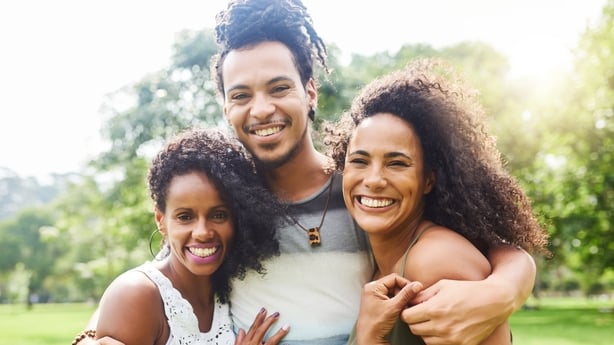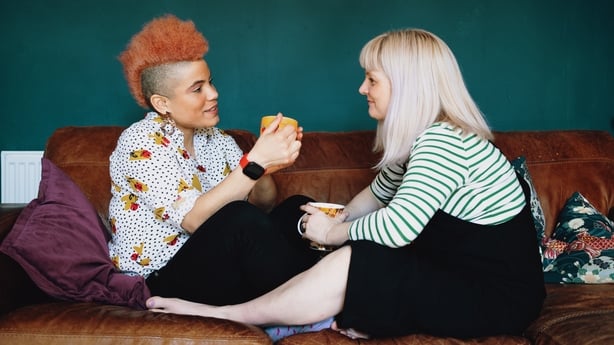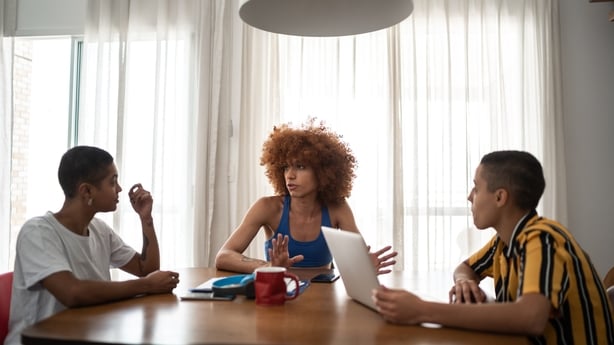Dil Wickremasinghe and Anne Marie Toole are two people who have decided to embark on a new journey in their relationship, by becoming polyamorous, and are now in what is described as a throuple, after meeting their girlfriend in December.
They joined The Ray D'Arcy Show to discuss their different kind of relationship. Listen back above.
Together for 13 years - eight of which they've been married - they've welcomed two sons, Phoenix and Xavier, as well as a business venture, setting up a psychotherapy practice together.

Anne Marie told Ray that she came out relatively late in life: "When I came out at 29, I came out to myself at 29. It was as big a surprise to me as to anybody else."
Only a month later, she met Dil at a mental health retreat, where she was assigned to the same room as Dil.
Now in a new phase of their relationship, they've decided to open it up. "Polyamory is the process of having multiple romantic relationships and doing so with full consent", Dil explains.
"In many ways, it's like the opposite of cheating, the opposite of being unfaithful, in inverted commas. That's what usually sometimes happens in a relationship where, without consent, someone will go off and play offside and whatnot, and that brings utter devastation and heartbreak, not just to the partner but also to the children."
Dil added that there was a long stretch of infidelity in her parents' marriage. "I remember as a child feeling incredibly betrayed and the house felt so unsafe and so fragile, the ground under my feet was not solid."
Anne Marie was the one to broach the subject of polyamory, partially because she went from coming out at 29 straight into a relationship. She noted how she had always known she wanted a more diverse way of connecting with people in relationships, and once it became clear that her relationship with Dil would lead to long-term commitment, those diverse ways of connecting "probably won't happen".

The couple had discussed polyamory throughout their relationship, Anne Marie says, and she added that when she brought the topic up again last September she "knew [their] relationship was rock solid".
"This was never about bringing chaos and destruction into the relationship. This was about expanding into more joy, more love, more connection", Anne Marie says.
As for Dil, she noted that she put pressure on Anne Marie through all the ways she connected to her: as a partner, a family member, a business partner, and more. "The idea of possibly losing her was just inconceivable for me."
"When Anne Marie said this to me, I remember thinking, maybe this is a way for me to actually create and invite more love and connection in my life because I have loads of friends, but there's a difference between having an intimate, sexual relationship and a friendship, and I thought maybe this could work for both of us."
Once they agreed to embark on this journey together they did the emotional research they needed to do about the polyamory community in Ireland. "There was a team of people", Dil said, about the experts they turned to help them figure this next stage out.
"Do this in a controlled, measured way", Dil said. "Don't go after one chat, oh let's go on an app and then expect things to go well."
"We went into every unhealthy pattern that had been developed" in their relationship, Anne Marie said.

Anne Marie and Dil then went onto dating apps as a couple, which they said worked well for them because they could be "clear and transparent" about their wants. A month later they met their partner, Cee, who was known to Dil.
Anne Marie noted that boundary setting, informed discussion, and communication have been pillars of their relationship since, and in the mix with that had to be "fun", which was automatic for them since they met Cee.
As for how they approach jealousy in the relationship, Anne Marie says that there's a lot of talking about it before any jealousy arises. "We all just sit and talk and connect on it. Jealousy is a really natural part of this process, both of us have experienced it", she added.
"But when it did happen it was about understanding the 'why' of it. Why is it there? And creating as much space for it as a legitimate emotion as any other that was arising from the experience and understanding it in the context of unmet need."
To listen to the full interview, click above.

